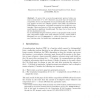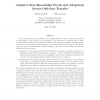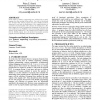19 search results - page 2 / 4 » Succinct NP Proofs from an Extractability Assumption |
EUROCRYPT
2006
Springer
13 years 11 months ago
2006
Springer
To prove that a secure key-agreement protocol exists one must at least show P = NP. Moreover any proof that the sequential composition of two non-adaptively secure pseudorandom fun...
TCC
2009
Springer
14 years 7 months ago
2009
Springer
In the setting of secure computation, a set of parties wish to securely compute some function of their inputs, in the presence of an adversary. The adversary in question may be st...
APPROX
2007
Springer
14 years 1 months ago
2007
Springer
Abstract. A fundamental goal of computational complexity (and foundations of cryptography) is to find a polynomial-time samplable distribution (e.g., the uniform distribution) and...
TCC
2009
Springer
14 years 7 months ago
2009
Springer
Verifiable random functions (VRFs), introduced by Micali, Rabin and Vadhan, are pseudorandom functions in which the owner of the seed produces a public-key that constitutes a commi...
SIGADA
2005
Springer
14 years 25 days ago
2005
Springer
Recent trends in software re-engineering have included tools to extract program slices from existing Ada procedures. One such tool has already been developed that extracts program...



